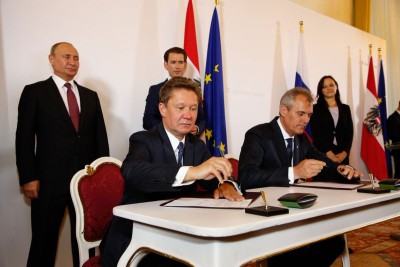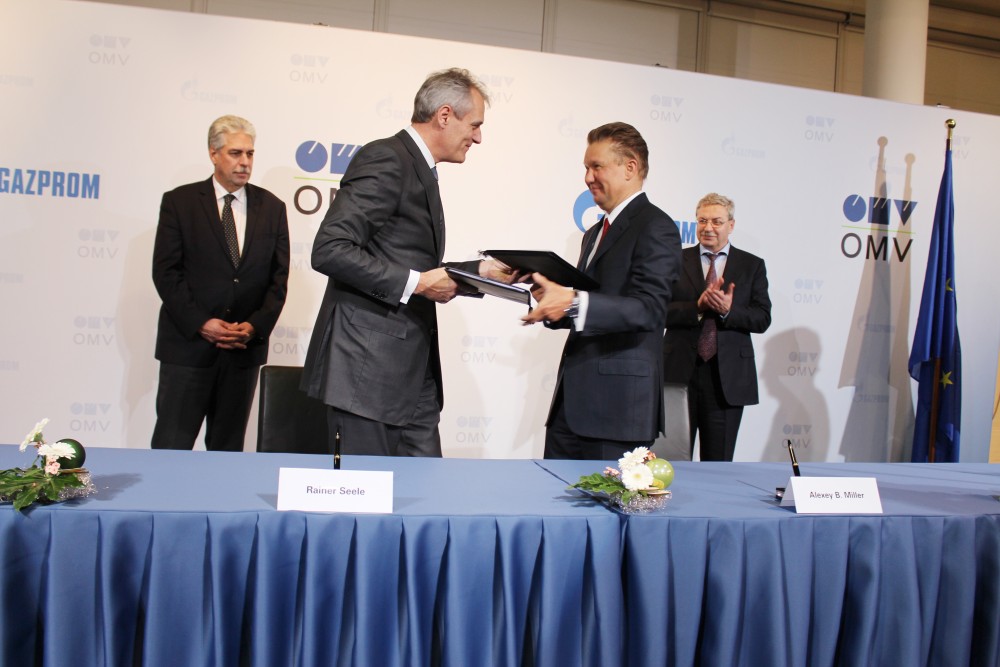How Gazprom Helps the Kremlin to Manipulate Austria
The Russian government uses the majority state-owned energy corporation Gazprom to exploit Europe's dependency on Russian natural gas, and Austria is no exception. Read how the Kremlin uses Gazprom to influence Austria.
 Russian President Vladimir Putin and former Austrian Chancellor Sebastian Kurz attending the signing of a cooperation agreement by Gazprom CEO Alexey Miller (front left) and former OMV CEO Rainer Seele (front right) in 2018. / Picture: © OMV Aktiengesellschaft
Russian President Vladimir Putin and former Austrian Chancellor Sebastian Kurz attending the signing of a cooperation agreement by Gazprom CEO Alexey Miller (front left) and former OMV CEO Rainer Seele (front right) in 2018. / Picture: © OMV Aktiengesellschaft

Just three years ago, Austrian Vice-Chancellor Heinz-Christian Strache was forced to resign after a video surfaced of him discussing the possibility of exchanging positive news coverage of his far-right Freedom Party for government contracts with a woman, whom he believed was an influential Russian businesswoman. While Austrians were rightfully outraged by Strache’s willingness to accept Russian interference in Austrian politics, many Austrians seem to ignore the Russian influence that has loomed over the country’s politics for decades–the Russian energy industry, particularly the majority state-owned corporation Gazprom.
Gazprom is a massive multi-national corporation that produces the most natural gas in the world and is the largest company in Russia by revenue as of 2019. The company was created in 1989 when the Soviet Ministry of Gas Industry was converted into a state-run corporation. Following the collapse of the Soviet Union, Gazprom was privatized, but the Russian government retook control in the early 2000s when Vladimir Putin first became President of Russia. The company is involved in all facets of the natural gas industry, including exploration and production, refining, transport, distribution and marketing, and power generation. By 2019, Gazprom was generating roughly 120 billion dollars in sales.
Not surprisingly, Gazprom has been accused of employing unfair, unethical, and, at times, even illegal practices. One of the most common allegations is that Russia uses Europe’s dependency on Gazprom’s natural gas to impose undue influence on the politics of European nations. In fact, a 2009 study by Roman Kupchinsky of the Jamestown Foundation found “the existence of dozens of non-transparent ‘gas trading’ companies established throughout Europe by the Russian state-controlled natural gas monopoly, OAO Gazprom.” The study also showed that “some of these middlemen companies have been linked to organized crime groups in Russia and in Europe while others are suspected of laundering millions of dollars into the accounts of high-level Russian, Ukrainian, and other officials.” Kupchinsky asserted that Gazprom and its middlemen companies “have a corrupting influence on local government officials” and “have been linked to numerous scandals and conflict of interest cases involving high-level officials in the EU.”
More recently, “The Economist” described Russia’s sinister tactics of using Gazprom to pressure Europe while simultaneously benefitting financially in the lead-up to the invasion of Ukraine. Europe relies heavily on natural gas from Russia, with some countries being more reliant than others. “The Economist” reports that, as Europe’s demand for natural gas increased in the months leading up to the invasion, Gazprom decreased its supply to the continent. According to “The Economist,” this led to a spike in gas prices and thus record profits for Gazprom. It also served the Russian government’s aim of reminding EU countries that are more reliant on Russian natural gas, such as Germany and Austria, of the problems that Russia can create for them at any time and turning these countries against those that are less reliant on Russian gas.
Despite and perhaps because of its suspect practices, Russia still supplies the EU with roughly 47 percent of its natural gas. Austria, in particular, is even more dependent on Russian natural gas, importing around 80% of its supply from Russia–a fact that Gazprom and, by extension, the Russian government continuously use to their advantage.
The Austrian oil and gas company OMV has a long history of cooperation with Gazprom that stretches back to when it was still the Soviet Ministry of Gas Industry. In 1968, the state-owned OMV was the first Western European company to conclude an agreement for importing natural gas from the Soviet Union. Over the years, this relationship only got closer, with OMV and Austria preserving friendly relations with Gazprom and Russia after the dissolution of the USSR.
Regarding the Kremlin’s influence in Austria, Andrew Weiss of the Carnegie Endowment for International Peace says, “The Kremlin relies on commercial links to underpin its political influence.” Although Austria does not trade too heavily with Russia, Weiss highlights that “the key business sectors linked to Russia have ties to the state, strong corporate lobbies, or both.” Weiss goes on to specifically mention Austria’s energy sector, particularly OMV, which is now only partially (31.5%) owned by the Austrian state-owned holding company ÖBAG. He notes OMV’s close ties to Gazprom and the Russian oil company Rosneft and points out that Austria is one of Gazprom’s biggest customers.
According to Weiss, the Former CEO of OMV Rainer Seele estimated that about 10 percent of the Austrian company’s capital was invested in Russian projects in 2018. Additionally, in 2018, Seele and Gazprom CEO Alexey Miller signed an agreement extending natural gas supplies from Gazprom to OMV and Austria until 2040. President Putin and then-Austrian Chancellor Sebastian Kurz personally attended the signing of the agreement. On top of all this, Gazprom not only delivers gas to Austria but also partially owns some of the various natural gas storage facilities in Austria, including the important Central European gas hub at Baumgarten. In addition, until the Russian invasion of Ukraine, OMV was planning to invest in Russian oil and gas fields, and it was helping fund Gazprom’s Nord Stream II gas pipeline. The pipeline was being fully financed by Gazprom, but whilst Gazprom was funding 50 percent of the costs, OMV, Shell, Engie, Wintershall and Uniper were collectively funding the remaining 50 percent and would receive interest on the provided loans.
Before the project was finally canceled, Nord Stream II was likely going to make Gazprom and OMV a lot of money but also reinforce Austrian reliance on Russian natural gas for energy. Once the planned Russian gas flows from Nord Stream II were to reach the EU gas network, substantial gas volumes were supposed to be transported onwards through Germany, Czech Republic and Slovakia to the Austrian gas hub in Baumgarten. These additional gas volumes would have strengthened Baumgarten’s role as an important gas hub for Central Europe as well as for international gas transit and would have further enhanced the security of gas supply for Central and South Eastern Europe. Given the political and economic implications of Nord Stream II for Austria, the government defended the new Russian pipeline until the bitter end.
Though it is not unique to Austria, the close ties between the energy industry and Austrian politics are unmistakable. Numerous Austrian politicians, both conservative and liberal, have worked in the energy industry before or after holding office, and sometimes both. For example, former Austrian Chancellor Wolfgang Schüssel of the People’s Party, who held office from 2000 to 2007, was given a job in 2019 as a member of the Board of Directors of Lukoil, the second-largest energy company in Russia behind Gazprom. Schüssel finally resigned from this position on March 4, 2022, after pressure mounted due to the ongoing war in Ukraine.
Schüssel is not the only former Austrian chancellor with ties to the energy industry to land a nice job in Russia after their tenure in office. Christian Kern of the Social Democratic Party of Austria, who served as chancellor from 2016-2017, earned a job on the Board of Directors of Russian Railways in 2019. Before becoming chancellor, Kern worked for the Austrian electricity supplier Verbund AG for nearly a decade. Despite Russia’s annexation of Crimea and support of the separatist movements in the Donbas Region in 2014, Kern remained a vocal critic of US and EU sanctions on the Nord Stream II Russian natural gas pipeline, which likely garnered him favor with the Russian government. However, like Schüssel, Kern resigned from his position at Russian Railways after Russia invaded Ukraine.
Karin Kneissl, the Austrian Foreign Minister from 2017-2019, was also appointed to the Board of Directors of the Russian oil giant Rosneft in 2021. She also serves as a broadcaster for the government-run media outlet “Russia Today.” Among the mentioned politicians, Kneissl was purported to have had a fairly close relationship with Vladimir Putin himself after videos surfaced of the Russian president personally attending her wedding and dancing with her. Kneissl denies having close ties to Putin and "RTL News" reported that she has claimed the president's attendance was a "coincidence" rather than a sign of their closeness. In the lead-up to the Russian invasion of Ukraine, Kneissl downplayed Western media reports of a potential invasion, referring to them on Twitter as "irresponsible warmongers." Unlike Kern and Schüssel, Kneissl has refused to give up her position on the Board of Rosneft even after the invasion.
Another Austrian politician, former Finance Minister Hans Jörg Schelling (2014-2017), was hired as a consultant by Gazprom for the Nordstream II pipeline project in 2018. In 2019, he was also nominated to the Supervisory Board of OMV. However, Mr. Schelling's nomination was later withdrawn due to a possible conflict with Austria's "cooling-off period" for former government ministers. Schelling was also alleged to have helped Austrian businessman in Russia Siegfried Wolf get a reduction in his tax debt.
The list of Austrian politicians with ties to the energy industry continues with the Social Democratic State Secretary of the Ministry of Finance from 1997 to 1999, Wolfgang Ruttenstorfer. Before becoming state secretary, Ruttenstorfer worked for OMV for 20 years, including being responsible for its natural gas division in 1996. Following his brief stint in politics, Mr. Ruttenstorfer again worked for OMV from 2000 to 2011, including as CEO from 2002 to 2011. Ruttenstorfer reportedly described his realignment of OMV as an international company as a great success–a statement that would presumably include its steady increase in dependency on Russian natural gas.
While five politicians with ties to the energy industry may not seem like a lot, the high-level positions and amount of influence of these individuals, including two heads of government, must be taken into consideration. Additionally, the list is by no means exhaustive, and the exact number is difficult to determine. To be clear, none of the aforementioned individuals has been convicted of any wrong-doing, but their relationships with the energy industry and Russia do not provide for good optics to say the least. Given the history of the energy industry in Austrian politics, Austria’s record of close ties with Russia, and its dependency on Gazprom for energy, it would not be unreasonable to assume that other Austrian politicians have also felt the pressure to take a more Russia-friendly approach. The country’s recent actions would even suggest as much.
For years, the Austrian government, under the control of both of the major political parties, defended Gazprom’s Nord Stream II natural gas pipeline. Even as Russia had amassed over 150,000 on Ukraine’s border and looked poised to invade, Austria remained hesitant to support sanctions on the pipeline, a stance that the Ukrainian Ambassador to Austria Olexander Scherba told Die Presse was “cold-hearted” and “close to treason.” Ultimately, it took the full-scale invasion of Ukraine for Austria to finally agree to scrap the project and cancel some of its other planned cooperation with Gazprom. In this context, Austrians should seriously consider if the Kremlin’s continued influence over their political and economic system should only be deemed unacceptable when it happens to be caught on camera.



